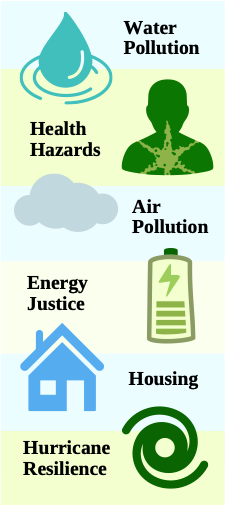Landscape Analysis
 This landscape analysis documents environmental justice efforts across North Carolina. This study was conducted as a research partnership between the Environmental Justice Action Research Clinic at the University of North Carolina at Chapel Hill and the North Carolina Environmental Justice Network. We conducted a survey (n = 24) and interviews (n = 9) to explore the EJ issues organizations work on, the populations they serve, the challenges they face, and the strategies they use to achieve their goals. We document these efforts among and between concerned citizens, non-profit, and academic organizations.
This landscape analysis documents environmental justice efforts across North Carolina. This study was conducted as a research partnership between the Environmental Justice Action Research Clinic at the University of North Carolina at Chapel Hill and the North Carolina Environmental Justice Network. We conducted a survey (n = 24) and interviews (n = 9) to explore the EJ issues organizations work on, the populations they serve, the challenges they face, and the strategies they use to achieve their goals. We document these efforts among and between concerned citizens, non-profit, and academic organizations.
We find that the main issues worked on across all organization types are issues around water and air quality. Interviewees were also concerned with associated health hazards and occupational exposures. Among non-profit organizations surveyed, there is minimal BIPOC representation among staff, yet they most frequently serve Black and rural populations. Primary barriers to achieving goals are time, political climate, and government/industry pushback. For various strategies to overcome challenges, interviewees underscored persistence, accessibility, and the importance of community engagement, organizing, and partnerships. Additionally, interviewees expressed the need to celebrate success and they shared a variety of things that count as a success, such as successful protests and demonstrations. Information from this landscape analysis may facilitate partnerships among organizations and may provide useful insights into ongoing strategies and organizing efforts used to address environmental injustices.
This work was supported by the Mingma Norbu Sherpa Community Engagement Fellowship through the Carolina Center for Public Service.
View the completed report of the findings: Landscape Analysis Report
